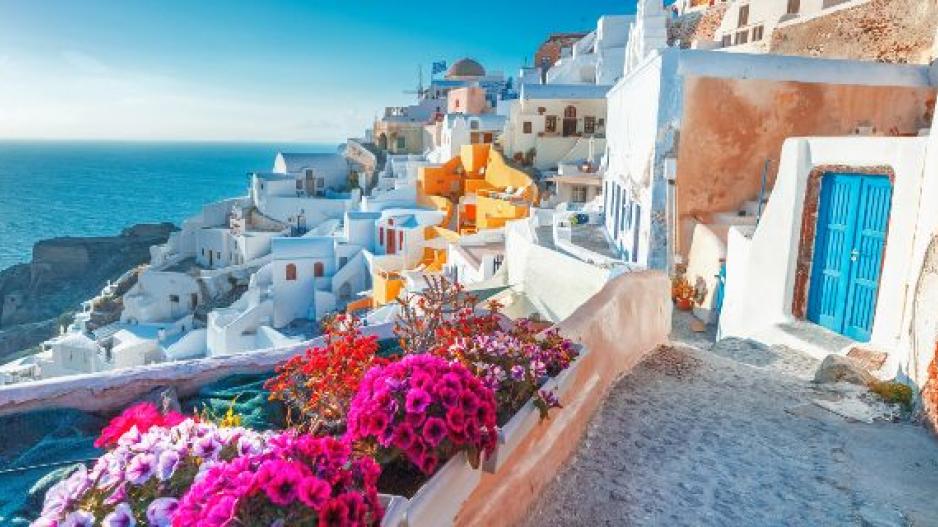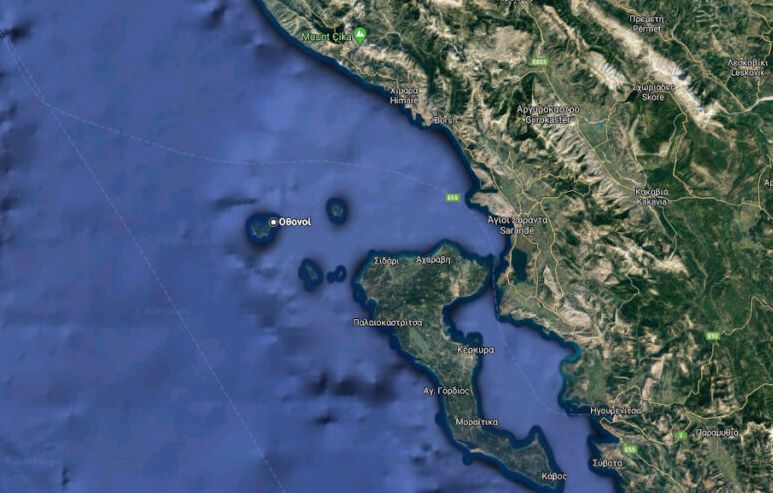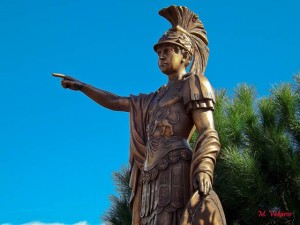Τα κάλαντα πρόκεινται για ένα συνονθύλευμα αρχαίων ειδωλολατρικών και χριστιανικών εθίμων, οι ρίζες των οποίων ξεκινούν από την αρχαιότητα. Ύστερα περνάνε στο Βυζάντιο και συνταιριασμένα με την αναπαράσταση της νύχτας της γέννησης του Χριστού, παίρνουν καινούργια μορφή και περιεχόμενο.
Παραλλαγές καλάντων ανάλογα την περιοχή
Ιδιαίτερο ενδιαφέρον παρουσιάζουν οι πολυποίκιλες παραλλαγές καλάντων που υπάρχουν σε όλη την Ελλάδα. Σχεδόν κάθε περιοχή, κάθε νησί, ενίοτε και κάθε χωριό έχει τα δικά του, ξεχωριστά κάλαντα. Οι στίχοι διαμορφώνονται ανάλογα με τις διαλέκτους και τα ιδιώματα της κάθε περιοχής και η μουσική ανάλογα με την παράδοση του κάθε τόπου. Χαρακτηριστικό παράδειγμα αποτελούν οι περιοχές των Επτανήσων, της Θράκης, της Ηπείρου, των Κυκλάδων, των Δωδεκανήσων, του Πόντου, της Κρήτης και της Μικρά Ασίας.
Θα πρέπει να σημειωθεί ότι τα παλαιότερα χρόνια τα κάλαντα δεν τραγουδιόντουσαν μόνο, αλλά και παίζονταν από παραδοσιακούς οργανοπαίκτες. Για αυτό τον λόγο, πολλές φορές θύμιζαν περισσότερο παραδοσιακά τραγούδια, παρά κάλαντα. Συνεπώς, το έθιμο αυτό διέπεται από το στοιχείο του αυθορμητισμού, της μουσικότητας και του αυτοσχεδιασμού.
Πανελλήνια κάλαντα
Τα Πανελλήνια κάλαντα πρόκειται ίσως για την πιο φημισμένη εκδοχή, αφού λίγο πολύ όλοι μας τα έχουμε τραγουδήσει όντας μικρά παιδιά.
Καλήν εσπέραν, άρχοντες,
κι αν είναι ορισμός σας,
Χριστού την θεία γέννησιν
να πω στ᾿ αρχοντικό σας.
Χριστός γεννάται σήμερον
εν Βηθλεέμ τη πόλει,
οι ουρανοί αγάλλονται,
χαίρει η φύσις όλη.
Εν τω σπηλαίω τίκτεται,
εν φάτνη των αλόγων,
ο βασιλεύς των ουρανών
και ποιητής των όλων.
Πλήθος αγγέλων ψάλλουσι
το «Δόξα εν υψίστοις»
και τούτον άξιόν εστί,
η των ποιμένων πίστις.
Αν είστε από τους πλούσιους,
φλωριά μην τα λυπάστε,
αν είστε από τους δεύτερους,
ξηντάρες και ζολότες
κι αν είστ᾿ από τους πάμφτωχους
ένα ζευγάρι κότες.
Και σας καληνυχτίζομε,
πάτε να κοιμηθήτε,
ολίγον ύπνο πάρετε,
πάλι να σηκωθήτε,
στην εκκλησιάν να τρέξετε
με άκραν προθυμίαν
και του Θεού ν᾿ ακούσετε
την Θείαν Λειτουργίαν.
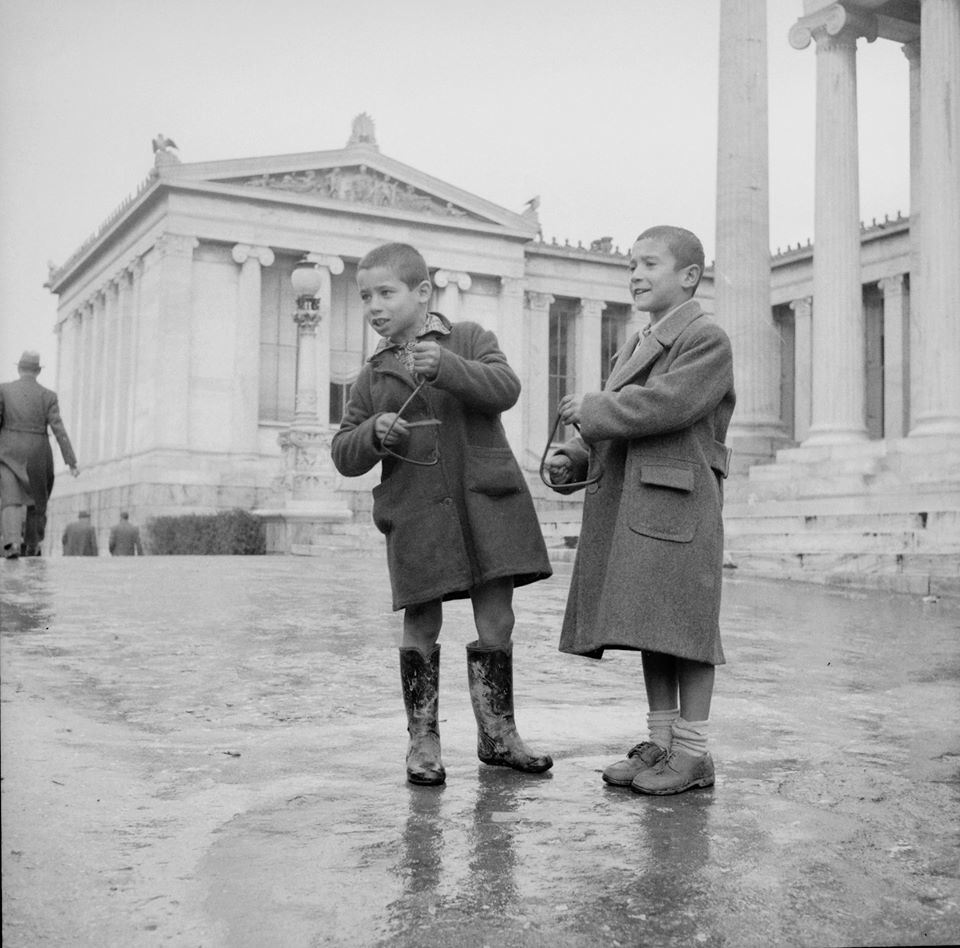
Κάλαντα άλλων περιοχών της Ελλάδας
Πελοποννήσου
Χριστούγεννα, Πρωτούγεννα, πρώτη γιορτή του χρόνου,
για εβγάτε, δέστε, μάθετε, πως ο Χριστός γεννιέται,
γεννιέται κι αναθρέφεται στο μέλι και στο γάλα,
το μέλι τρών᾿ οι άρχοντες, το γάλα οι αφεντάδες
και το μελισσοχόρταρο το λούζουντ᾿ οι κυράδες. Κυρά ψιλή, κυρά λιγνή, κυρά γαϊτανοφρύδα, κυρά μ᾿ όταν στολίζεσαι να πας στην εκκλησιά σου,
βάζεις τον ήλιο πρόσωπο και το φεγγάρι αγκάλι
και τον καθάριο αυγερινό τον βάζεις δαχτυλίδι. Εμείς εδώ δεν ήρθαμε να φάμε και να πιούμε, μόνο σας αγαπούσαμε κι ήρθαμε να σας δούμε·
εδώ που τραγουδήσαμε πέτρα να μη ραγίσει
κι ο νοικοκύρης του σπιτιού πολλούς χρόνους να ζήση. Δώστε μας και τον κόκορα, δώστε μας και την κότα,
δώστε μας και πέντ᾿, έξ᾿ αυγά, να πάμε σ᾿ άλλη πόρτα.
Όπως παρατηρούμε, ο ανώνυμος ποιητής προτρέπει τους πολίτες να γιορτάσουν με τον γνωστό ελληνικό τρόπο τα Χριστούγεννα : «για εβγάτε, δέστε, μάθετε πως ο Χριστός γεννιέται». Από την αρχαιότητα μέχρι σήμερα, ο Έλληνας γιορτάζει στην «αγορά», στην πλατεία, στην ύπαιθρο. Η γιορτή σχεδόν ταυτίζεται με έξοδο, επίσκεψη, χορό στην πλατεία του χωριού. Συνήθως η γιορτή είναι τριήμερη· μια μέρα ξεφάντωμα, μια μέρα αφιερωμένη στον Θεό και μια μέρα αφιερωμένη στην οικογένεια.
Με τα Χριστούγεννα, οι Αρκάδες τσοπάνηδες περιμένουν και τα
«Πρωτούγεννα», τις πρώτες γέννες στα γιδοπρόβατα. Το «γάλα» των προβάτων
και το «μέλι» (βασικοί πόροι επιβίωσης των Αρκάδων) τιμούν το
νεογέννητο Θείο Βρέφος το οποίο «αναθρέφεται με μέλι και με γάλα».
Από τα Κάλαντα δεν θα έλειπε ποτέ η καθημερινή ζωή. Ένας
κόκορας και «πέντ᾿, έξ᾿ αυγά» ιδιαίτερα για τους Αρκάδες, εκτός από ένα
καλό γεύμα, αποτελούσαν και οικονομικό κεφάλαιο· μπορούσαν δίνοντας λίγα
αυγά στον μπακάλη, να αγοράσουν τετράδια και ό,τι άλλο ήθελαν. Τι πιο
φυσικό λοιπόν να ενσωματωθούν και αυτά τόσο στα τραγούδια τους όσο και
στις ευχές τους.
Πόντου
Χριστός γεννέθεν, χαρά στον κόσμον,
ακαλή ώρα, καλή ση μέρα,
ακαλόν παιδίον οψές γεννέθεν,
ψες γεννέθεν, ουρανεστάθεν.
Τον εγέννησεν η Παναία,
τον ανέσταισεν Αειπαρθένος.
Εκαβάλλκεψεν χρυσόν πουλάριν,
εκατήη στο σταυροδρόμιν.
Έρπαξαν ατόν οι σκύλ᾿ Εβραίοι,
σκύλ᾿ Εβραίοι και μίλ᾿ Εβραίοι.
Ας σ᾿ αρχοντικά κι άσ᾿ σην καρδίαν,
γαίμαν έσταξεν, φλογήν κι άσ᾿ εφάνθεν.
Όπου έσταξεν κι εμυροστάθεν,
εμυρίσ᾿ ατόν ο κόσμος όλος.
Να μυρίσ᾿ ατόν κι εσύ, αφέντα,
εκατήη στο σταυροδρόμιν.
Έμπα σον νουντάν κι έλα σην πόρτα,
έξου στέκουν τα παλληκάρια.
Έβγαλ᾿ τον κισέ και δος παράδας
έξου στέκουν τα παλληκάρια.
Και θυμίζουν στον νοικοκύρην,
νοικοκύρην και βασιλέαν.
Τα Ποντιακά Κάλαντα των Χριστουγέννων περιέχουν όλη τη ζωή του θεανθρώπου, από τη στιγμή της γέννησης, μέχρι τη στιγμή της σύλληψης, χωρίς όμως να προχωρούν και στη θανάτωση, γεγονός που θα ερχόταν σε αντίθεση με το χαρμόσυνο γεγονός των Χριστουγέννων. Στα Ποντιακά Πρωτοχρονιάτικα κάλαντα συναντούμε σημαντικές παραλλαγές, με σημαντικότερες αυτές της Γαράσαρης. Όλοι σχεδόν οι στίχοι είναι αφιερωμένοι στην υπό τούρκικη κατοχή Κωνσταντινούπολη, μεταβάλλοντας το χαρμόσυνο μήνυμα της έλευσης της νέας χρονιάς σε θρήνο και μοιρολόι.
Τα κάλαντα στον Πόντο αλλά και στα χωριά όπου εγκαταστάθηκαν οι Πόντιοι μετά το 1923, ψάλλονταν από τα παιδιά μέχρι και την δεκαετία του 1960, το απόγευμα της παραμονής, των Χριστουγέννων και της Πρωτοχρονιάς. Τα παιδιά έβγαιναν συνήθως κατά παρέες δύο, τριών ή περισσοτέρων ατόμων και αντί για τρίγωνα κρατούσαν καράβια που στόλιζαν με διάφορα στολίδια.
Σε κάποια χωριά, όπως στο Οχυρό Δράμας τα μεγαλύτερα παιδιά, κατασκεύαζαν καράβια στα οποία τοποθετούσαν και κεριά τα οποία άναβαν (όταν το επέτρεπε ο καιρός). Το θέαμα ήταν φαντασμαγορικό! Κατά τη διάρκεια δε που έψαλλαν τα κάλαντα, κουνούσαν το καράβι σαν να βρισκόταν σε φουρτουνιασμένη θάλασσα. Τα κάλαντα που έψαλλαν ήταν:
Τρία καράβια αρμένιζαν στης Πόλης τα πογάζια.
Το ’να αρμενίζει με νοτιά, τ’ άλλο με τραμοντάνα
το τρίτο το καλλίτερο…
Τρία καράβια αρμένιζαν στης Πόλης τα πογάζια.
Τό ’να αρμενίζει με πανί, τό άλλο με το γκάζι
το τρίτο το καλλίτερο…
Θράκης
Χριστός γεννιέται, χαρά στον κόσμο,
χαρά στον κόσμο, στα παλληκάρια.
Σαράντα μέρες, σαράντα νύχτες,
η Παναγιά μας κοιλοπονούσε.
Κοιλοπονούσε, παρακαλούσε,
τους αρχαγγέλους, τους ιεράρχες.
Σεις αρχαγγέλοι και ιεράρχες,
στη Σμύρνη πηγαίν’τε, μαμές να φέρ᾿τε.
Άγια Μαρίνα, Άγια Κατερίνα,
στη Σμύρνη πάνε, μαμές να φέρουν.
Όσο να πάνε κι όσο να έρθουν,
η Παναγιά μας ηληυτηρώθη.
Στην κούνια το ’βαλαν και το κουνούσαν
και το κουνούσαν, το τραγουδούσαν.
Σαν ήλιος λάμπει, σα νιό φεγγάρι,
σα νιό φεγγάρι, το παλληκάρι.
Φέγγει σε τούτον το νοικοκύρη, με τα καλά του,
με τα παιδιά του, με την καλή τη νοικοκυρά του…
Τα κάλαντα Χριστουγέννων και Πρωτοχρονιάς της Θράκης, έχουν ρίζες που χάνονται βαθιά μέσα στην ιστορία και παρουσιάζουν μια πραγματικά εξαιρετική ποικιλία. Ειδικότερα η Ανατολική Θράκη ως περιοχή είναι ιδιαίτερα γνωστή για την πλούσια λαογραφική και δημοτική της παράδοση.
Σε πολλά χωριά της Θράκης, τα κάλαντα των Χριστουγέννων τα έλεγαν μεταμφιεσμένοι «για να πάει καλά η χρονιά», όπως έλεγαν. Με τη συνοδεία γκάιντας, έψαλλαν σε κάθε σπίτι ειδικά κάλαντα, ανάλογα με τα πρόσωπα της οικογένειας και τα επαγγέλματά τους. Τα κάλαντα τα έλεγαν είτε στην είσοδο του σπιτιού, είτε μέσα στο σπίτι, ενώ σ’αυτά περιέχονταν παινέματα αλλά και πειράγματα για τον κάθε νοικοκύρη και τα μέλη της οικογένειάς του.

Ηπείρου
Ελάτε εδώ, γειτόνισσες
και εσείς γειτονοπούλες,
τα σπάργανα να φτιάξουμε
και το Χριστό ν’ αλλάξουμε.
Τα σπάργανα για το Χριστό,
ελάτε όλες σας εδώ. (δις)
Να πάμε να γυρίσουμε
και βάγια να σκορπίσουμε,
να βρούμε και την Παναγιά,
οπού μας φέρνει τη χαρά.
Τα σπάργανα για το Χριστό,
ελάτε όλες σας εδώ. (δις)
Κοιμάται στα τριαντάφυλλα,
γεννιέται μες στα λούλουδα,
γεννιέται μες στα λούλουδα,
κοιμάται στα τριαντάφυλλα.
Τα σπάργανα για το Χριστό,
ελάτε όλες σας εδώ,
τα σπάργανα να φτιάξουμε
και το Χριστό ν’ αλλάξουμε.
Η σημαντικότερη αναφορά που γίνεται στα κάλαντα Χριστουγέννων της Ηπείρου είναι ένα τοπικό χριστουγεννιάτικο έθιμο, τα «σπάργανα» του Χριστού. Τα σπάργανα δεν είναι άλλο από τηγανίτες στην πλάκα, ένα νοστιμότατο τοπικό γλύκισμα, μελωμένο με ζαχαρόνερο και πασπαλισμένο με καρύδια και κανέλα που το ετοίμαζαν την παραμονή των Χριστουγέννων.
Την παραμονή κυρίως στις πόλεις της Ηπείρου τα παιδιά έβγαιναν στις γειτονιές να πούνε τα χριστουγεννιάτικα κάλαντα. Στα χωριά το έθιμο αυτό δεν ήταν ιδιαίτερα διαδεδομένο γιατί τα σπίτια είναι αραιοκατοικημένα και το κρύο τσουχτερό κρύο δεν επιτρέπει να περπατούν μικρά παιδιά σε μεγάλες αποστάσεις μέσα στο κρύο. Αυτό διατηρείται ακόμη και σήμερα, καθώς πολύ λίγα παιδάκια στην ευρύτερη περιφέρεια της Ηπείρου τριγυρνούν στα σπίτια για να πούνε τα κάλαντα των Χριστουγέννων.
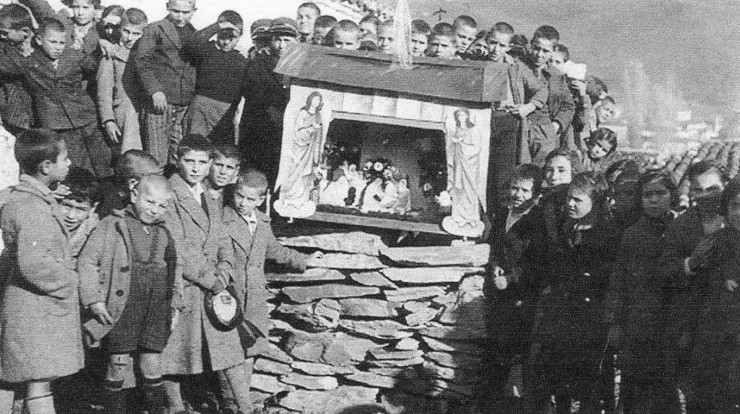
Κρήτης
Καλήν εσπέραν, άρχοντες, κι αν είναι ορισμός σας,
Χριστού την θεία γέννηση να πω στ᾿ αρχοντικό σας.
Χριστός γεννάται σήμερον εν Βηθλεέμ τη πόλει,
οι ουρανοί αγάλλονται, χαίρετ᾿ η φύσις όλη.
Εν τω σπηλαίω τίκτεται, εν φάτνη των αλόγων,
ο βασιλεύς των ουρανών και ποιητής των όλων.
Κερά καμαροτράχηλη και φεγγαρομαγούλα
και κρουσταλλίδα του γιαλού και πάχνη από τα δέντρα,
απού τον έχεις τον υγυιό το μοσχοκανακάρη,
λούζεις τον και στολίζεις τον και ’ς το σκολειό τον πέμπεις.
Κι ο δάσκαλος τον έδειρε μ᾿ ένα χρυσό βεργάλι
και η κυρά δασκάλισσα με το μαργαριτάρι.
Είπαμε δα για την κερά, ας πούμε για την βάγια:
Άψε βαγίτσα το κερί, άψε και το διπλέρι
και κάτσε και ντουσούντιζε είντα θα μας ε-φέρεις,
γι᾿ απάκι, για λουκάνικο, για χοιρινό κομμάτι,
γι᾿ απάκι, για λουκάνικο, για αγριμιού κομμάτι,
κι από τον πίρο του βουτσιού να πιούμε μία γεμάτη.
Κι από την μαύρη όρνιθα κανένα αυγουλάκι.
Κι αν το ’χει κάμει η γαλανή ας είναι ζευγαράκι.
Κι από το πιθαράκι σου λάδι ’να κουρουπάκι
κι αν είναι ακροπλιάτερο βαστούμε και τ᾿ ασκάκι.
Φέρε πανιέρι κάστανα, πανιέρι λεπτοκάρυα
και φέρε και γλυκό κρασί να πιουν τα παλληκάρια.
Κι αν είναι με το θέλημα, άσπρη μου περιστέρα,
ανοίξατε την πόρτα σας να πούμε καλησπέρα.
Δώστε μας για τον κόπο μας, ό,τι ’ναι ο ορισμός σας
και ο Χριστός μας πάντοτε να είναι βοηθός σας.
Και εις έτη πολλά!
Ικαρίας
Για σένα κόρη όμορφη
ήρθαμε να τα πούμε
και τα καλά Χριστούγεννα
για να σου ευχηθούμε.
Φέρτε μας κρασί να πιούμε
και του χρόνου να σας πούμε.
Και του χρόνου να σας πούμε,
φέρτε μας κρασί να πιούμε.
Αν έχεις κόρη όμορφη,
βάλε τη στο τσιμπίδι,
και κρέμασε την αψηλά,
να μην τη φαν οι ψύλλοι.
Φέρτε μας κρασί να πιούμε
και του χρόνου να σας πούμε.
Και του χρόνου να σας πούμε,
φέρτε μας κρασί να πιούμε.
Σ’ αυτό το σπίτι που ’ρθαμε
καράβια ’ν’ ασημένια,
του χρόνου σαν και σήμερα
να ’ναι μαλαματένια.
Φέρτε μας κρασί να πιούμε
και του χρόνου να σας πούμε.
Και του χρόνου να σας πούμε,
φέρτε μας κρασί να πιούμε.
Για σένα κόρη όμορφη,
ήρθαμε να τα πούμε
και τα καλά Χριστούγεννα
για να σου ευχηθούμε.
Φέρτε μας κρασί να πιούμε
και του χρόνου να σας πούμε.
Και του χρόνου να σας πούμε,
φέρτε μας κρασί να πιούμε.
https://www.youtube.com/watch?v=x9Ot16Gidf8
Σμύρνης
Καλήν εσπέραν, άρχοντες, κι αν είναι ορισμός σας,
Χριστός γεννάται σήμερον εν Βηθλεέμ τη πόλει.
Εν τω σπηλαίω τίκτεται, εν φάτνη των αλόγων. Κερά ψηλή, κερά λιγνή, κερά καμαροφρύδα.
Κερά μ᾿, όταν στολίζεσαι να πας στην εκκλησία.
Έχεις και κόρην έμορφη, που δεν έχει ιστορία. Μήδε στην πόλη βρίσκεσαι, μήδε στην Καισαρεία.
Έχεις και γιον στα γράμματα, υγιόν εις το ψαλτήρι.
Να τον ’ξιώσει και ο Θεός, να βάλει πετραχήλι.
Δωδεκανήσων
Aύτη είναι η ημέρα
όπου ήρθ᾿ ο Λυτρωτής
από Μαριάμ Μητέρα,
εκ Παρθένου γεννηθείς. (δις)
Άναρχος αρχήν λαμβάνει
και σαρκούται ο Θεός,
ο Αγέννητος γεννάται
εις την φάτνην ταπεινός. (δις)
Όσοι έχετε στα ξένα
να δεχθήτε με καλό
και του χρόνου με υγεία
τον Θεό παρακαλώ. (δις)
